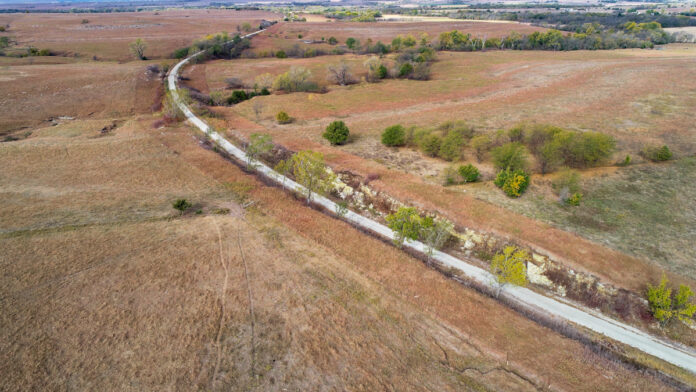
Rails to Trails Conservancy, the nation’s largest trails, walking and bicycling advocacy organisation, has announced that the Flint Hills Trail State Park in Kansas will be the newest member of the organisation’s Hall of Fame after receiving more than 80% of the public vote.
“It is clear why so many people rallied around the Flint Hills Trail State Park as the next Hall of Fame Trail,” said Ryan Chao, RTC’s president.
“This trail stands out as a prime example of how trails bring joy, provide cultural and historic connection, and deliver economic opportunity—all critical to quality of life across America. This trail has catalysed the state’s trail economy and will serve as inspiration for countless communities to emulate.”
Flint Hills Trail State Park is the longest trail in Kansas, spanning 93 miles across the rural eastern part of the state and connecting more than a dozen communities, including several trail towns and significant historical and cultural sites to the Kaw (Kanza) Nation. The trail will ultimately stretch 118 miles between Osawatomie and Herington, offering further opportunities for families to walk, run, bike and ride horses.
In 2022, the state of Kansas received a $24.8m “Rebuilding American Infrastructure with Sustainability and Equity” (RAISE) grant from the U.S. Department of Transportation to further connect the trail, recognizing its unique impact on the state’s transportation and economic development future.
“I am pleased the Flint Hills Trail State Park will be recognized as a member of the Rails to Trails Conservancy’s Hall of Fame. This honor is a testament to the natural beauty of our state and the commitment of Kansans who have worked to preserve it,” said Governor Laura Kelly.
“In addition to promoting healthier lifestyles, Kansas State Parks contribute millions to the economy annually. The importance of these parks to our state’s economic well-being, as well as to the quality of life of Kansans, cannot be overstated.”
The trail, which is home to one of the last remaining tallgrass prairie ecosystems in the world, the Flint Hills, reflects the history of the railroad and region, such as Allegawaho Heritage Memorial Park, a 158-acre park honouring the history of the Kaw Nation, and the John Brown Memorial Park and Museum State Historic Site, where visitors can learn about the famous abolitionist and the movement to make Kansas a free state. The route also partially traces the Santa Fe National Historic Trail, a key travel corridor in the 1800s that stretched between Missouri and New Mexico, and is part of the American Discovery Trail, a 6,800-mile hiking and biking trail across the country.
“The Flint Hills Trail isn’t just a path across Kansas. It’s a journey through the essence of Kansas—through the land, the cultures and the endeavors of the communities,” said Jeffrey Bender, Kansas Department of Wildlife and Parks’ Region Supervisor, Parks.
The trail was officially designated as a state park by the Kansas legislature in 2018 and recognized as a National Recreation Trail by the U.S. Department of the Interior in 2020. It also directly links to the Prairie Spirit Trail State Park, an inductee in RTC’s Hall of Fame that extends another 51 miles.
The trail was among three nominees voted on by the public. The other nominees were the Murdock Canal Trail in Utah and the East Central Regional Rail Trail in Florida. The Flint Hills Trail State Park in Kansas joins of Hall of Fame trails recognised for their outstanding scenic value, use, amenities, historical significance and community benefit.






